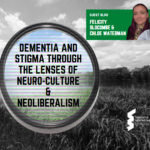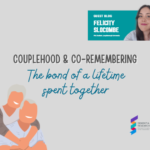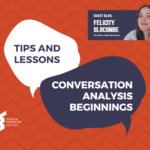
Felicity Slocombe
Name:
Felicity Slocombe
Job title:
PhD Student
Place of work / study:
Loughborough University
Area of Research:
Interaction and dementia
How is your work funded?
Loughborough University and the ESRC.
Tell us a little about yourself:
I’m in the first year of my PhD research, having started during the pandemic. I’m from Sheffield and have a deep love for the North, but lots of my family are from Devon so I also have a love for there too. Dogs are the best things ever. The end.
I came to Loughborough University in 2015, and I haven’t really left since! I did my undergraduate degree in Social Psychology, following this I applied for 1+3 ESRC funding for a Masters and PhD that I proposed myself. I was unsuccessful in this application, but decided to do the Masters anyway as I could just about manage to fund this through student finance. After my MSc Social Science Research (Communication and Media) – quite the mouthful! – I had a year out where I tried to find a job in social science research as research has always been something I loved being part of. Unfortunately, I didn’t get many interviews, nevermind job offers. I started to think about how I could get to a research job and started to realise more and more that doing a PhD would be the best option for me in terms of the experience I would get and connections I could make. I applied again for PhD funding, this time to a project which had been proposed by two of my supervisors. It looked amazing and was so similar to what I had previously wanted to do, but it had also been thought out a lot more than I could have! I’m now most of the way through the first year of PhD study and it’s a topic that still gets me really excited!
What does your research focus on?
My research focuses on identity and dementia and how identity can be managed interactionally – how we can help support identity of people living with dementia through our conversations. One part of the project will involve using conversation analysis to look at videotaped interactions between people with dementia and various others (family/carers/healthcare professionals) and interrogate how identity is constructed in talk. Another part of the research will look at media representations of dementia in newspaper coverage, analysing the discourses within these. Key examples from the analysis of newspaper representations will then form the discussion for focus groups with people with dementia and family carers. As part of the research outputs, a communication workshop will be piloted with carers.
Do you have any advice for someone looking to embark on a career in dementia research?
If it’s something you are really passionate, go for it, and you can make a real difference. It also really helps to talk to someone who’s taken the step you are thinking about taking, get some insider knowledge and glimpse at what it could be like for you too.
What are the best bits about being an ECR?
There are so many others out there too, and it’s great to have a network of lovely people, be it people interested in dementia research or people interested in similar research methods. You can be part of other groups and organise events and give talks etc. – everything increases the reach of your research.
What do you see as the main challenges?
For me, my main challenges are that I tend to get a bit lost and lose sight of the end goal of the project, so it’s needing to remind myself of that. I have a lot of inspirational quotes on the wall haha.
What do you write about?
For my blogging, I plan to write about a range of things, I would like to introduce people to alternative ways to looking at identity in dementia and how conversation analysis can bring new insights. I would also like to talk to you about ACTInG (Applied Cognition Technology and Interaction Group) – a multidisciplinary research network I am part of interested in dementia research in the areas just mentioned. I would also like to share reviews of events, discuss topics such as dementia and disability rights activism and maybe some tips on using research methods etc.!
Why did you choose to work in dementia?
It was a combination of things, I initially found it a really interesting area when studying a cognitive psychology module in the 2nd year of my undergrad degree. My own Gran was diagnosed with dementia shortly after and ever since I have done research on the topic of dementia when I was able to for projects/dissertations.
Tell us a fun fact about yourself:
I am an archer, I could probably shoot something if it was stood still and no further than 50yds away… hehe

 Print This Post
Print This Post


